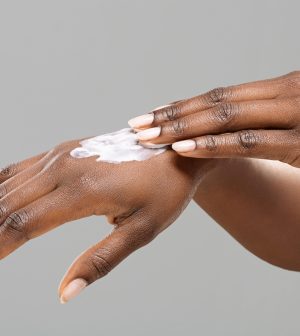- 7 Best Breads for Maintaining Stable Blood Sugar
- Gelatin vs. Collagen: Which is Best for Skin, Nails, and Joints?
- The Long-Term Effects of Daily Turmeric Supplements on Liver Health
- Could Your Grocery Store Meat Be Causing Recurring UTIs?
- Are You Making This Expensive Thermostat Error This Winter?
- Recognizing the Signs of Hypothyroidism
- 10 Strategies to Overcome Insomnia
- Could Artificial Sweeteners Be Aging the Brain Faster?
- Techniques for Soothing Your Nervous System
- Does the Water in Your House Smell Funny? Here’s Why
FDA Warns of Dangers From Skin Lightening Creams

Skin lightening products can be dangerous for consumers when they contain harmful ingredients that are illegal for over-the-counter sales, the U.S. Food and Drug Administration warned Wednesday.
The potentially harmful ingredients are hydroquinone or mercury, the agency said in a news release.
People who have used products with hydroquinone have suffered side effects that included rashes, facial swelling, and permanent skin discoloration, the FDA warned. Meanwhile, mercury is highly toxic and can damage the nervous, digestive and immune systems, as well as the lungs, kidneys, skin and eyes.
Skin lightening products are marketed as treatments for uneven skin tone, acne, age spots, freckles and wrinkles. Companies may describe skin lightening products as skin bleaching, fading, evening, brightening or whitening products. The products are often sold as creams, lotions, soaps or powders in shops that cater to Hispanic/Latino, Asian, African or Middle Eastern communities, the FDA said.
These products limit the skin’s production of melanin, responsible for skin, hair and eye color. But hydroquinone and mercury can build up in the body over time.
“Skin lightening products containing hydroquinone are not approved for over-the-counter sale,” the FDA said. “However, you can get a prescription skin product containing hydroquinone from your health care provider. The use of mercury in skin lightening products is banned.”
Here’s more from the FDA on the dangers of skin lightening products:
Consumers should check product labels and avoid those containing hydroquinone or mercury. Mercury may be listed as mercurous chloride, calomel, mercuric, mercurio or Hg. Illegal products may be inaccurately labeled. Avoid products with handmade labels, labels in languages other than English, or no label at all, the FDA said.
Report any bad reaction from a skin product to your health care provider and to the FDA at www.fda.gov/medwatch/report.htm or by calling 1-800-FDA-1088.
More information
The World Health Organization has more on mercury in skin products.
SOURCE: U.S. Food and Drug Administration, news release, Aug. 30, 2022
Source: HealthDay
Copyright © 2026 HealthDay. All rights reserved.










